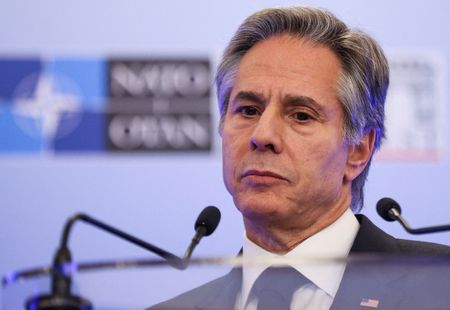By Andrea Shalal and David Lawder
COLLEGE PARK, Md. (Reuters) -The European Union’s top trade official on Monday called for urgent steps before the end of the year to modify a U.S. climate law that would cut off the bloc’s electric vehicles from U.S. tax credits, calling the measure discriminatory.
This year’s $430-billion Inflation Reduction Act offers generous tax credits of $7,500 for new purchases of Tesla , Ford and other North American-made EVs, which the 27-country bloc fears will significantly hurt European automakers.
EU Trade Commissioner Valdis Dombrovskis, speaking to Deutsche Welle before a meeting of the U.S.-EU Trade and Technology Council (TTC) said the law threatened to undermine progress made by the year-old transatlantic forum.
“With all our discussions, we are in a sense making a step forward, but with the Inflation Reduction Act we’re making two steps backwards, so we need to reconcile it,” he said.
Dombrovskis said the U.S.-EU task force was addressing the issue, but that more work was needed.
“We need to move from this engagement to concrete results and we need to do this still this year” because some of the provisions were due to kick in next year, he said.
The TTC has focused in its first two meetings on regulatory co-operation and presenting a united front against China’s non-market economic practices.
French Finance Minister Bruno Le Maire said he and German economy minister Robert Habeck have started talks with their U.S. counterparts on exemption for all EU-made green products. But he also said the EU needed its own equivalent of the IRA.
European Commission head Ursula von der Leyen said on Sunday the EU would adapt its state aid rules to prevent an exodus of investment triggered by the IRA, while offering cooperation over raw materials to counter China’s dominance.
Dombrovskis said the EU was looking at how to make its own subsidies “more efficient” and potential increases in joint U.S.-EU financing.
The dispute threatens to overshadow the agenda of the TTC meeting on the University of Maryland campus in College Park, Maryland, U.S. and EU officials said.
Participants include U.S. Secretary of State Antony Blinken, Commerce Secretary Gina Raimondo, U.S. Trade Representative Katherine Tai and European Commission Executive Vice Presidents Valdis Dombrovskis and Margrethe Vestager.
JOINT ROADMAP
In a Dec. 1 draft of a joint statement to be issued later on Monday, the two sides are to say: “We acknowledge the European Union’s concerns and underline our commitment to address them constructively.”
The draft document, which was seen by Reuters and may still be revised, did not set out specific measures.
A White House spokesperson said the climate law would be part of the overall discussions on trade and said the U.S. side was “committed to continuing to understand EU concerns” through the newly-established task force.
The meeting would produce a “joint roadmap” to assess trustworthy artificial intelligence technologies as well as a task force to reduce research barriers related to quantum computing science and technology, the spokesperson said.
European and South Korean officials criticized the U.S. law at the G20 Summit in Indonesia last month. During his state visit to Washington last week, French President Emmanuel Macron told broadcaster CBS it was a “job killer” for Europe.
U.S. President Joe Biden told Macron in Washington that there could be “tweaks” to the law to make it easier for European countries to participate in the credits, but it remains unclear how that will be accomplished.
French officials said they are hopeful an executive order from the White House could give European nations a break, without the need for seeking revisions from Congress, a move the White House wants to avoid.
(Reporting by David Lawder; Additional reporting by Foo Yun Chee in Brussels; Editing by Heather Timmons, Clarence Fernandez, Arun Koyyur and Deepa Babington)











